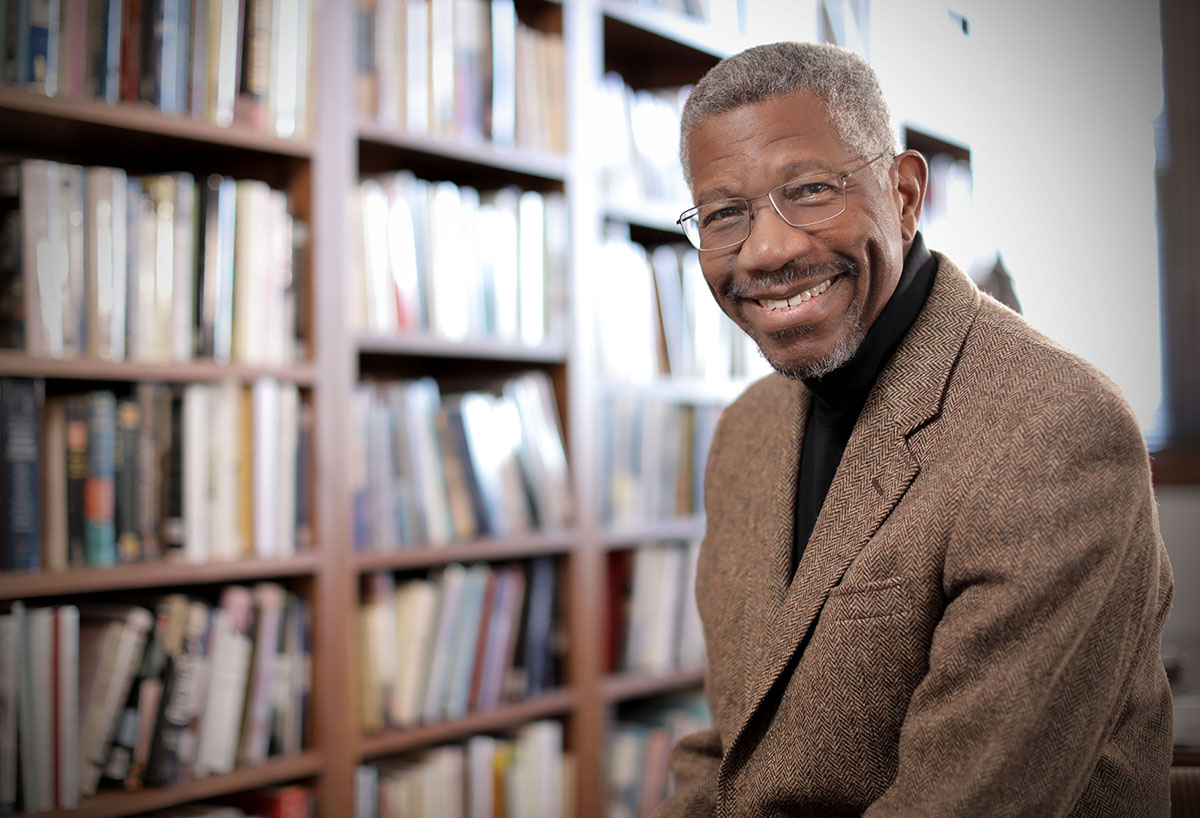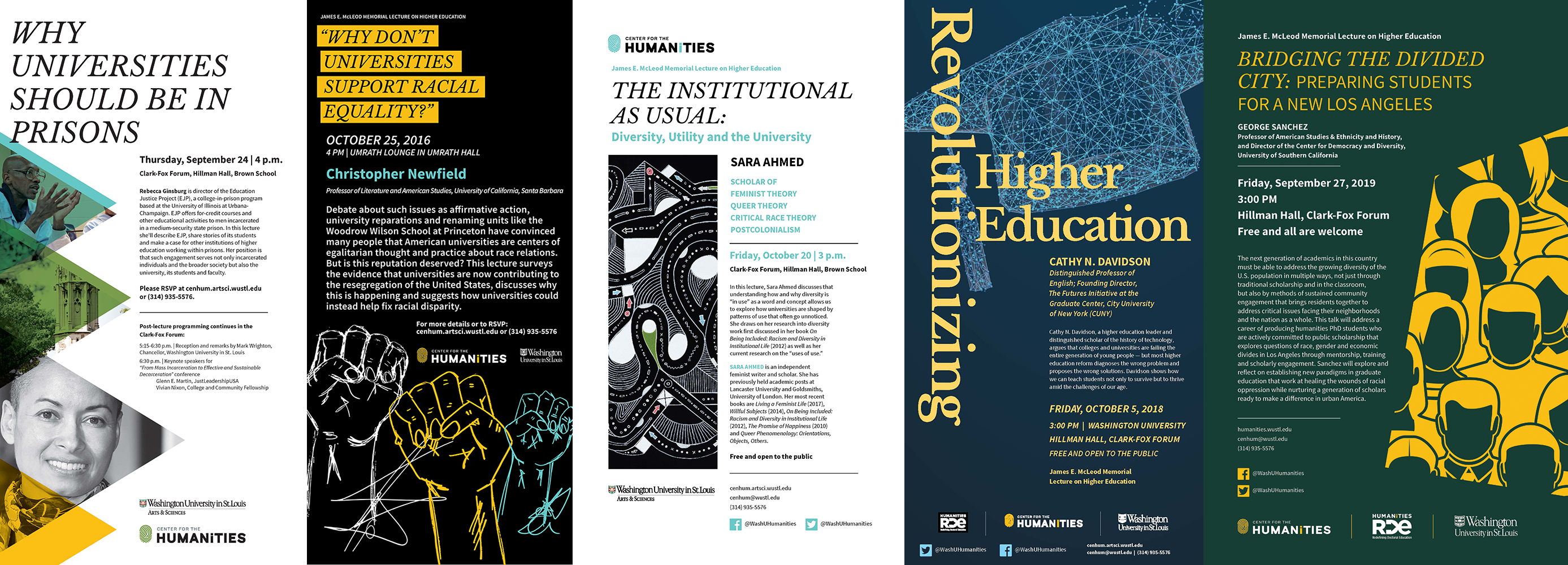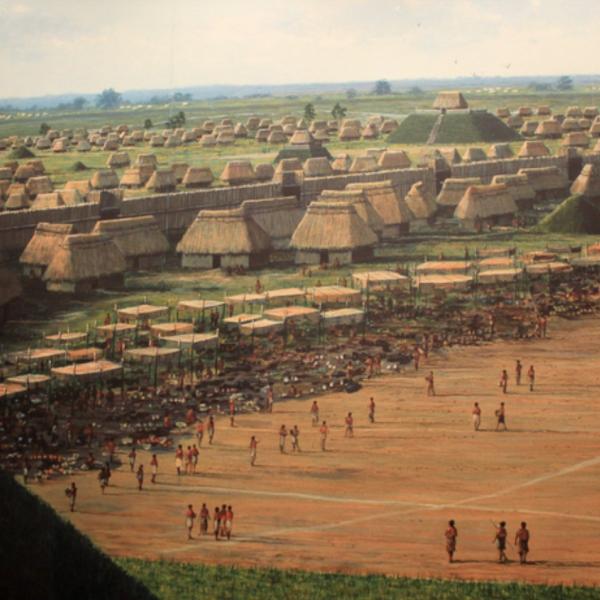Q&A with keynote speaker Gerald Early by Jean Allman, the J.H. Hexter Professor in the Humanities and director of the Center for the Humanities, and Jonathan Fenderson, associate professor of African and African-American studies, both in the Department of African and African-American Studies.

James E. McLeod Memorial Lecture on Higher Education
Thursday, September 30, 2021
“Remembering James McLeod and the Rise of Black Studies at Washington University”
Gerald Early, the Merle Kling Professor of Modern Letters and Past Chair of the Department of African and African American Studies
Those with a Washington University affiliation may attend in person; all others are invited to register for a Zoom presentation of the lecture.
On September 30, Gerald Early, the Merle Kling Professor of Modern Letters, will give the annual James E. McLeod Memorial Lecture on Higher Education, titled “Remembering James McLeod and the Rise of Black Studies at Washington University.” The lecture series addresses the role of the liberal arts in higher education, a subject especially meaningful to Dean McLeod. We asked two of Early’s colleagues in the Department of African and African-American Studies, Jean Allman and Jonathan Fenderson, to check in with Early for a preview of his talk, with insights about Dean McLeod, the evolution of Black studies at Washington University, and why the lecture series Early founded in McLeod’s memory focuses on the mission of higher education.
Dean James McLeod is remembered so fondly by everyone who knew and worked with him during his years at Washington University from 1974 to 2011. Through the John B. Ervin Scholars Program, the James E. McLeod Honors and Awards, the McLeod scholarship program, and so much else, Dean McLeod’s work carries on, touching the lives of nearly everyone who comes to this campus. For those who never had the privilege of personally knowing Dean McLeod, what would you like them to know about him? How would you describe his impact, his lasting legacy?
James was an effective leader because he got things done without making enemies. He was not demonstrative. He was quiet and calm. He was patient in dealing with others. If we consider these traits as interpersonal tactics, then it is clear why he had success. People felt they could trust him, that he was reasonable, that he listened even if he did not agree. Also, his manner made people who might oppose him on an issue think that he would not resolve the matter if he prevailed by making them lose face. That is important.

A decade ago, as the founding director of the Center for the Humanities, you initiated what has become one of the signature annual events on the university’s calendar: the James E. McLeod Memorial Lecture on Higher Education, with Walter E. Massey as the inaugural lecturer. Why was it important to remember Dean McLeod in this particular way, through an annual lecture series? How would you describe his vision of higher education?
James’s view was holistic: The student is a person. Being a student was not a role but a developmental stage. But the student should not be condescended to or coddled. Students should be enriched. His motto was knowing every student “by name and by story.” This vision had a big impact on the quality of undergraduate education here and I believe under James we had a renaissance in undergraduate education that tremendously enhanced what we were as a university, as a community with a particular mission. I think it is good that the [humanities] center is remembering this achievement, this epoch, with an annual lecture series that might consider ways that higher education can be made better, ways that the mission can be clarified and, if need be, corrected.

In your McLeod lecture, you will be remembering Dean McLeod, in the context of the rise of Black studies at Washington University. We know that Dean McLeod directed the program from 1987 to 1992, but did he also play a role in the consolidation or growth of the program, after its founding in 1969? Do you think that his vision of higher education informed his administrative approach to Black studies or vice versa?
James was a good director because he stabilized the program. It was thought by many at that time that the program would be terminated. This was not paranoia. The university had terminated its sociology department in 1991. If it could terminate a department, it could certainly terminate a program. The program existed in an administrative limbo: It was exceedingly difficult for anyone appointed in it to be tenured because it was not a department, yet tenure-track appointments were made in Black studies as if it were a department or as if it could fully control how its faculty were evaluated for tenure. Morale was low when James took over but improved during James’ time as director. James’ leadership settled the matter that the program would not be shut down.
You directed the program in AFAS from 1992 to 1999 and then took on that role again in 2014. Were there notable differences in the scholarly terrain of Black studies between the 1990s and the 2010s? In the place of AFAS in Arts and Sciences?
The 1990s were difficult because AFAS, as it was known then, had insufficient faculty to be what it was supposed to be. Departments were typically not interested in partnering with us to hire faculty in part because departments see programs as a drain, diverting faculty time and energy, with the program offering little in return. And the only way we could get tenure-track faculty was through a joint appointment with a department. Also, many departments in the 1990s did not prioritize hiring a person who studied the Black aspect of the discipline. It was not that the subject matter was ignored or neglected entirely. It was, for many departments then, not a priority. It was nice to have such a person but not essential. Finally, there was the issue of different expectations: A department may want a person who studied the Black aspect of the discipline but not in a way that was a fit with what AFAS might have wanted or needed.
The 2010s were different: First, the mood of the country was different. We had a Black president in 2008. Race and the study of Blacks became more important and a bit chic. Many young PhDs were studying Blacks or making sure that some dimension of race was a prominent part of their work. Departments felt the study of Blacks to be a more vital aspect of their disciplines.
Later, the killing of Michael Brown, the murder of George Floyd, the rise of the Black Lives Matter Movement, the presidency of Donald Trump intensified racial matters, which strengthened the Diversity, Equity and Inclusion Movement. This led to an increasing demand not only for Black faculty but for Black studies. So a recrudescence of the kind of political activism that created Black studies at the white university achieved Black studies’ renewal and expansion.
During your second term as program director, you led the effort to transform AFAS from a program to a department. Why did you consider this an important or necessary step for the program?
Departmental status means that AFAS can hire its own faculty, conduct its own searches, create tenure standards and procedures for its faculty, mentor its own young scholars in its own way. This is crucial to AFAS establishing its own identity, its independence as a scholarly endeavor in the development of its curriculum and in choosing to launch a graduate program, if it wishes. There was no way that AFAS would have had a future as a maturing area of scholarship had it not become a department.
Headline image by Tyler Callahan via Unsplash




